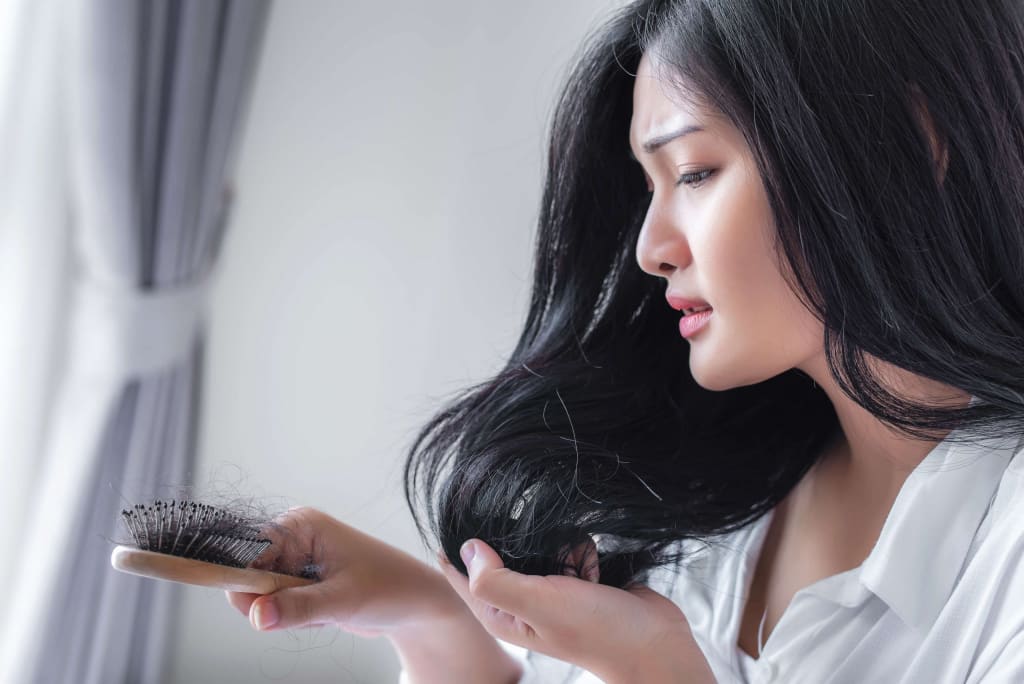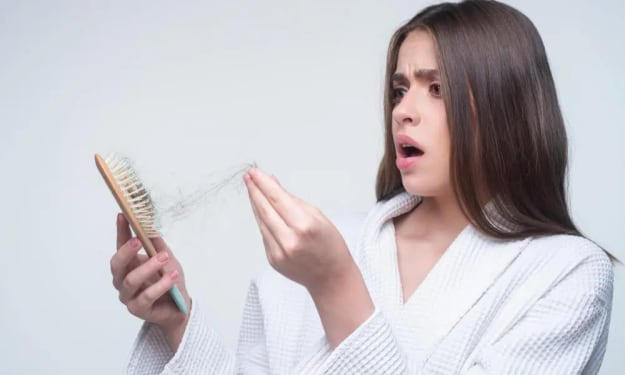The Impact of Stress on Hair Loss
Understanding the Connection Between Stress and Hair Loss

Hair loss is a common problem that affects millions of people across the globe. Stress, one of several causes of hair loss, often said to be triggered by factors such as genetics or medical conditions can make it worse or even cause it by thinning the hair and losing it. Therefore, understanding the relationship between stress and hair loss is crucial for controlling and treating this condition. This blog post delves into how stress leads to hair fall including what types of hair loss are related to stress, its biological mechanisms, and useful ways of managing stress and hair health.
Understanding Hair Growth
The growth of hair takes place in three main phases which occur cyclically:
1. Anagen Phase: Herein follicles grow new hairs actively determining them over the years.
2. Catagen Phase: It lasts just a few weeks as a transition period that marks no more hair growth with a contraction in the size of the follicle.
3. Telogen Phase: The resting phase on average lasts for months with only a falling-off point at which new hairs start to grow from each follicle commencing their cycle all over again.
Typically, about fifty to one hundred strands shed around us daily during this cycle; nevertheless, significant interruptions within it may cause observable baldness. Stress can disrupt this process prematurely pushing more hairs into the telogen phase.
Types of Hair Loss Linked to Stress
Telogen Effluvium
This is a common type of temporary hair shedding occurring due to an increased number of follicles entering the telogen phase because of stress. Consequently, a dramatic increase in hair drop usually occurs after a few months since a stressful event or period took place. In most cases, this form is reversible when underlying stress is treated.
Alopecia Areata
Alopecia Areata is an autoimmune condition where the immune system attacks hair follicles leading to patchy hair loss. Though the exact cause remains unknown, it is widely believed that stress triggers or aggravates the condition. Alopecia areata is characterized by the rapid onset of hair loss in small round patches localized on the head, face, and other parts of the body.
Trichotillomania
This is a psychological disorder marked by an irresistible compulsion to pull out one’s hair. It is often triggered by anxiety, stress, or other emotional problems. This baldness may be severe and tends to occur only in certain areas such as the scalp, eyebrows, and eyelids.
The Science Behind Stress-Induced Hair Loss
Biological Response to Stress
Whenever there is any form of stress on an individual’s system, it sets off a fight-or-flight response that has complex biological underpinnings. Stress hormones including cortisol and adrenaline which primes the body for danger are discharged during this reaction.
Hormonal Changes
Stress-induced hair loss depends greatly on the cortisol hormone known as ‘the stress hormone’. By disturbing the growth cycle of hairs elevated levels of cortisone encourage more follicles into the telogen phase. Continuous exposure to high levels of cortisol due to long-term stress would exacerbate even further hair loss.
Hair Follicles’ Impact
The ordinary functioning of hair follicles can be influenced by stress-triggered hormonal variations. The cycle of hair growth could go haywire making it fall prematurely and slow to regrow. In alopecia areata, for example, stress may cause an immune response that specifically targets the hair follicles thereby causing them to die.
Identifying Stress-Related Hair Loss
Recognizing the Signs and Symptoms
Recognition of stress-related hair loss involves reviewing trends in hair shedding. Sudden or increased shedding and thinning, bald patches may all suggest a stress-induced loss of hair. High-stress times call for close monitoring of these symptoms.
Differentiating Stress-Related Hair Loss from Other Types
Understanding when and how the hair is lost helps distinguish different types related to stress. For instance, there is usually a gap of several months between the occurrence of telogen effluvium after a stressful situation while male pattern baldness has a more gradual process. Confirming this with a healthcare provider will be enough.
Consulting a Healthcare Professional
In case you have doubts that your loss of hair may be due to mental pressure; make it fast to see a doctor. A comprehensive examination such as blood tests will be conducted on you after which your scalp will also be analysed to confirm what exactly contributed to your condition hence give medication accordingly.
Managing and Reducing Stress
Lifestyle Changes to Reduce Stress
Adopting healthy living conditions considerably reduces levels of anxiety thus promoting general healthiness. Regular exercises, well-balanced diet plans as well as getting enough sleep form foundation stones for managing stressful conditions in life. This serves because physical activities aid in releasing endorphins which are natural stress relievers while consumption of diets rich in nutrients enhances overall body health including hairs.
Stress Management Techniques
It becomes important for one’s daily routine to be encompassed by stress management techniques to help reduce its effect on the body and hair. Meditations, yoga, mindfulness, relaxation, etc. are some of the methods used in reducing stress. Therefore, deep breath exercises and progressive muscle relaxation can manage one’s levels of stress.
Professional Help
An individual who is unable to cope with his/her stresses can consider this as a valuable move. In other words, therapy, counselling, and support groups provide structured environments for the examination of those factors that bring about tension. This may involve cognitive-behavioural therapy (CBT) and other therapeutic approaches that will present practicable means of managing such issues thus enhancing mental health.
Treatments for Stress-Induced Hair Loss
Medical Treatments
Various medical treatments can alleviate stress-induced hair loss such as:
• Minoxidil: By extending the anagen phase of the hair growth cycle, minoxidil promotes hair re-growth when used topically.
• Corticosteroids: for alopecia areata reduce inflammation and immune responses.
• Other Medications: depending on the underlying cause medics may also decide to focus on specific problems like hormone imbalances through administering drugs.
Natural Remedies and Supplements
Hair supplements that are natural or even home remedies minimize anxiety:
• Essential Oils: such as lavender oil, rosemary oil or peppermint oil can stimulate faster growth of hairs while at the same time bringing relaxation to our bodies.
• Vitamins and Minerals: like biotin; D vitamin; selenium etc. is also useful in promoting the general healthiness of hair strands.
• Herbal Treatments: E.g., saw palmetto and ginseng could help balance hormones thereby lowering one’s rate of losing hair.
Hair Care Practices
One must employ gentle care practices to deal with cases where loss is due to pressure situations. Avoiding tough procedures such as curling, straightening, and treating hair with harsh chemicals or pulling it tight can be a good idea. One can also expose one’s hair to mild conditioners as well as shampoos considering that such simple techniques will help in maintaining healthy hairs.
Preventive Measures
Proactive Stress Management
Preventing stress-induced hair loss requires proactive stress management. Regularly engaging in stress reduction practices, maintaining a balanced life, and being conscious of stress levels can help prevent chronic stress and its impact on hair health.
Regular Health Check-Ups
Regular check-ups enable early detection and management of potential health issues that can cause hair loss. Keeping an eye on the overall body condition and dealing with concerns promptly can also prevent hair loss from stress.
Healthy Lifestyle Practices
Integrating well-being habits into your daily routine is good for both your general health and your hair. A healthy diet as well as being physically active, sleeping enough, and keeping oneself hydrated are among the ways to avoid losing hair because of anxiety.
Conclusion
Stress has complex relations with different types of alopecia when it causes or intensifies them. Appreciating this connection is important to effectively manage and mitigate against alopecia. Thus, practicing various strategies to reduce stress, having professional help when required, or leading a healthy lifestyle contributes to managing stresses related to alopecia which in turn affects overall care for the head.
About the Creator
Enjoyed the story? Support the Creator.
Subscribe for free to receive all their stories in your feed.






Comments
There are no comments for this story
Be the first to respond and start the conversation.